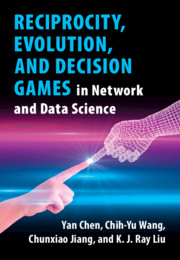Book contents
- Frontmatter
- Contents
- Preface
- 1 Basic Game Theory
- Part I Indirect Reciprocity
- Part II Evolutionary Games
- Part III Sequential Decision-Making
- 11 Introduction to Sequential Decision-Making
- 12 Chinese Restaurant Game: Sequential Decision-Making in Static Systems
- 13 Dynamic Chinese Restaurant Game: Sequential Decision-Making in Dynamic Systems
- 14 Indian Buffet Game for Multiple Choices
- 15 Hidden Chinese Restaurant Game: Learning from Actions
- 16 Wireless Network Access with Mechanism Design
- 17 Deal Selection on Social Media with Behavior Prediction
- 18 Social Computing: Answer vs. Vote
- Index
17 - Deal Selection on Social Media with Behavior Prediction
from Part III - Sequential Decision-Making
Published online by Cambridge University Press: 01 July 2021
- Frontmatter
- Contents
- Preface
- 1 Basic Game Theory
- Part I Indirect Reciprocity
- Part II Evolutionary Games
- Part III Sequential Decision-Making
- 11 Introduction to Sequential Decision-Making
- 12 Chinese Restaurant Game: Sequential Decision-Making in Static Systems
- 13 Dynamic Chinese Restaurant Game: Sequential Decision-Making in Dynamic Systems
- 14 Indian Buffet Game for Multiple Choices
- 15 Hidden Chinese Restaurant Game: Learning from Actions
- 16 Wireless Network Access with Mechanism Design
- 17 Deal Selection on Social Media with Behavior Prediction
- 18 Social Computing: Answer vs. Vote
- Index
Summary
Deal selection on Groupon represents a typical social learning and decision-making process, where the quality of a deal is usually unknown to the customers. The customers must acquire this knowledge through social learning from other social media, such as reviews on Yelp. Additionally, the quality of a deal depends on both the state of the vendor and the decisions of other customers on Groupon. How social learning and network externality affect the decisions of customers in deal selection on Groupon is the main focus of this chapter. We develop a data-driven game-theoretic framework to understand rational deal selection behaviors across social media. The sufficient condition of the Nash equilibrium is identified. A value-iteration algorithm is utilized to find the optimal deal selection strategy. We utilize the Groupon–Yelp data set to analyze the deal selection game in a realistic setting. Finally, the performance of the social learning framework is evaluated using real data. The results suggest that customers make decisions in a rational way instead of following naive strategies, and there is still room to improve their decisions with assistance from a game-theoretic framework.
- Type
- Chapter
- Information
- Publisher: Cambridge University PressPrint publication year: 2021

